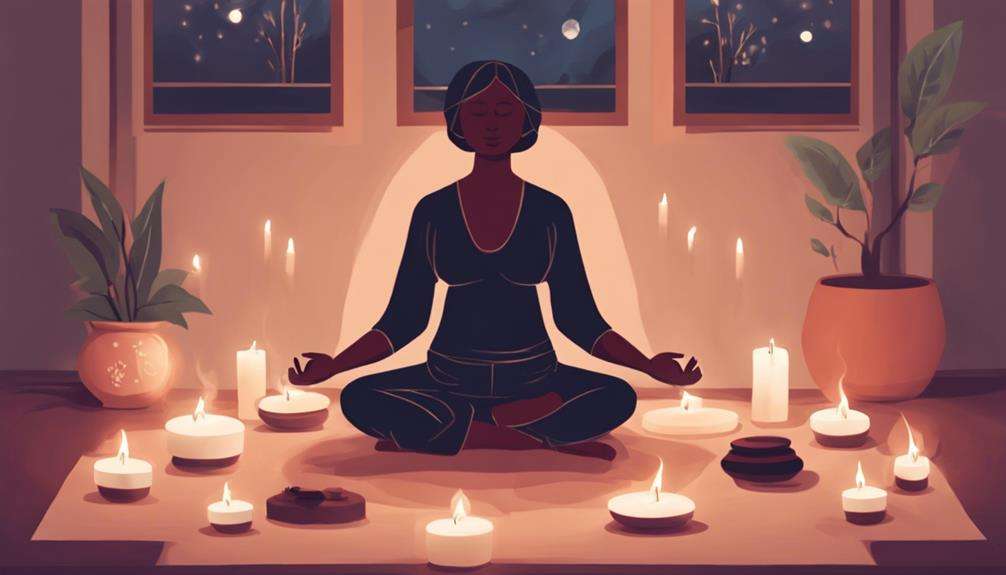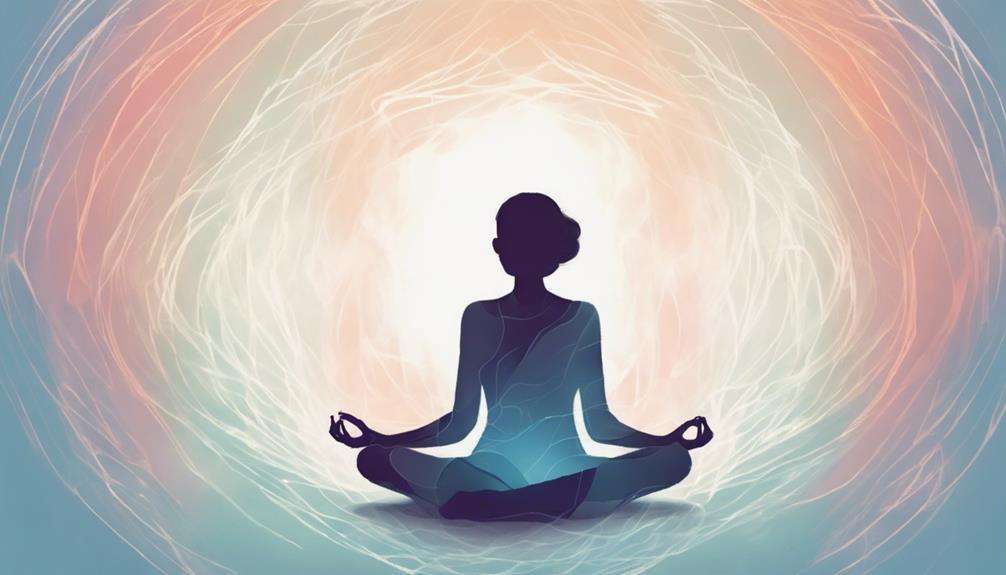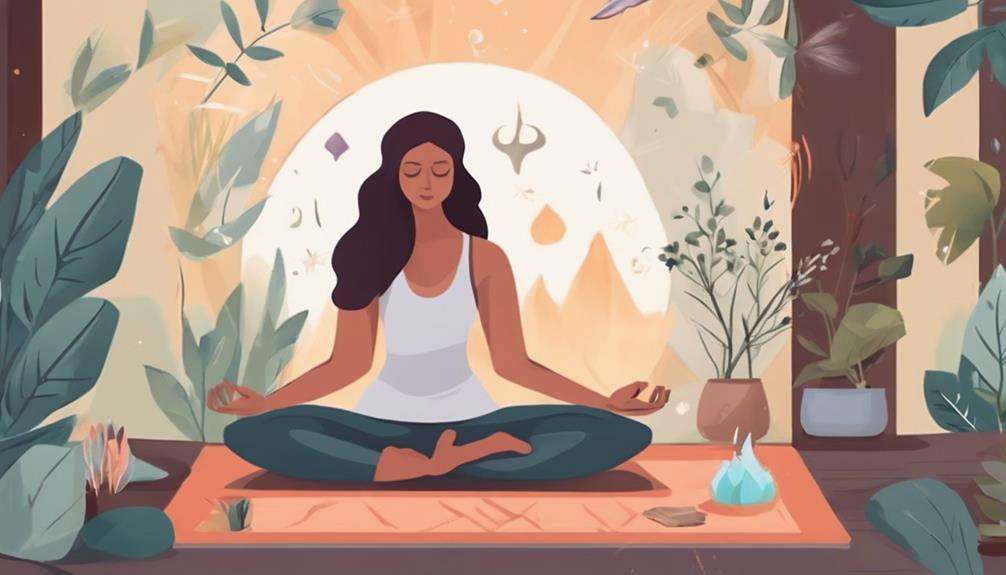If you've ever found your mind racing, heart pounding, and thoughts spiraling out of control, you're not alone. Anxiety can be a relentless companion, but what if there was a way to quiet the storm within?
Through the gentle practices of meditation and mindfulness, a pathway towards relief and wellness emerges. Imagine a world where your mind is your sanctuary, where peace reigns supreme, and anxiety takes a back seat.
Take a moment to explore how these ancient techniques can transform your inner landscape and lead you towards a calmer, more balanced existence.
Key Takeaways
- Yoga and meditation offer holistic relief for anxiety
- Mindfulness practices reduce stress hormones like cortisol
- Breathwork and meditation improve emotional well-being
- Tailoring meditation to personal preferences enhances relaxation
Understanding the Role of Yoga
To truly grasp the significance of yoga in alleviating anxiety, one must delve into its profound integration of physical postures, mindful breathing techniques, and meditation practices. Yoga serves as a powerful mind-body practice that aims to enhance overall well-being by promoting relaxation and reducing anxiety levels.
Through the combination of various elements such as physical postures, controlled breathing, and focused meditation, yoga provides a holistic approach to managing stress and anxiety. Research indicates that regular yoga practice can lead to a decrease in cortisol levels, the hormone associated with stress, while increasing the production of serotonin, a neurotransmitter linked to feelings of happiness.
Impact of Yoga on Anxiety
Yoga's impact on anxiety is profound, as it serves as a holistic practice that effectively reduces symptoms by calming the nervous system and promoting relaxation. Engaging in yoga can lead to a significant reduction in anxiety levels through various mechanisms:
- Reduction of Stress Hormones: Regular yoga practice has been linked to lower levels of stress hormones like cortisol, which in turn decreases anxiety.
- Mindfulness and Breathing Techniques: Yoga incorporates mindfulness and specific breathing exercises that help manage and alleviate anxiety symptoms effectively.
- Enhanced Emotional Well-being: Practicing yoga can improve emotional well-being, elevate mood, and induce feelings of calmness, all contributing to anxiety reduction.
- Cultivating Inner Peace: The mind-body connection fostered by yoga aids in cultivating inner peace, reducing tension associated with anxiety.
- Promotion of Relaxation: By promoting relaxation through physical postures and breathing, yoga helps alleviate anxiety and promote a sense of tranquility.
Techniques for Managing Anxiety
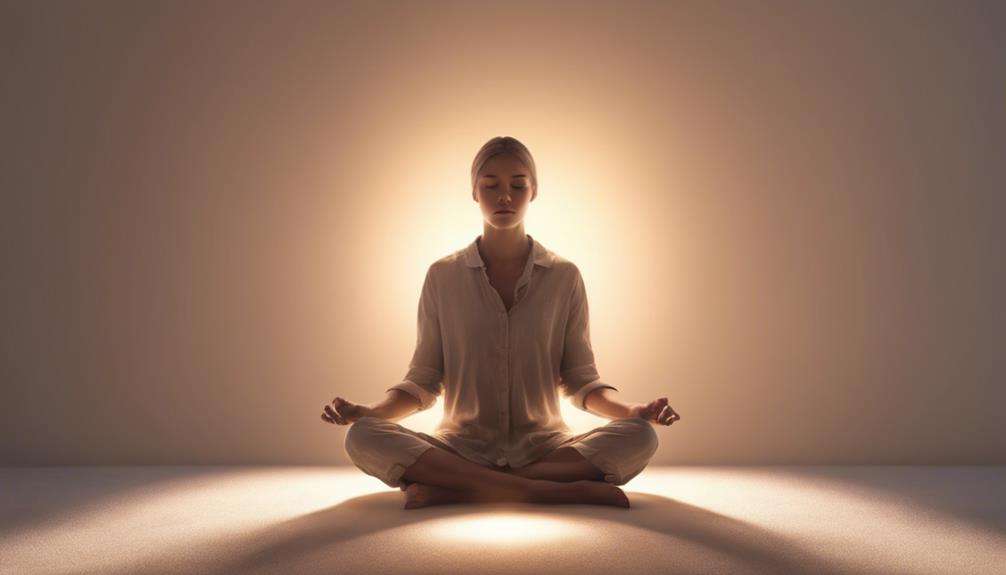
Managing anxiety effectively involves utilizing various techniques that promote relaxation and mindfulness, aiding in reducing symptoms and improving emotional well-being. Mindfulness meditation has been proven to be a powerful tool in reducing anxiety levels.
Techniques like deep breathing, body scanning, and guided imagery can help in managing anxiety by promoting relaxation through meditation. Participating in mindfulness-based stress reduction (MBSR) programs has shown significant reductions in anxiety levels and increased emotional well-being.
Regular meditation practice can rewire the brain, decreasing amygdala activity—the brain's fear center—and enhancing the prefrontal cortex's ability to regulate emotions. By cultivating non-judgmental awareness of thoughts and feelings, mindfulness meditation allows individuals to observe anxiety triggers without reacting impulsively, leading to improved anxiety management.
Incorporating these techniques into your daily routine can have a positive impact on your overall well-being and help you navigate through moments of anxiety with more ease and resilience.
Yoga Poses for Calming the Mind
Engage in calming yoga poses to soothe your mind and reduce anxiety effectively. Practicing specific yoga poses can be a powerful tool to calm the mind and promote relaxation. Here are some key poses that can help you achieve a sense of calmness and emotional balance:
- Child's Pose: This gentle stretching pose allows you to focus on deep breathing, helping to quiet the mind and reduce anxiety.
- Legs Up the Wall: By inverting the body gently, this pose activates the parasympathetic nervous system, promoting relaxation and mental clarity.
- Seated Forward Bend: This pose encourages deep breathing and mindfulness, allowing you to release tension and find inner peace.
- Corpse Pose: A relaxation pose that promotes emotional balance by letting go of stress and tension, leading to a calmer state of mind.
- Cat-Cow Stretch: This dynamic movement helps in syncing breath with movement, promoting relaxation and reducing anxiety through gentle stretching.
Incorporating these yoga poses into your routine can provide a holistic approach to calming the mind and enhancing overall well-being.
Breathwork Practices for Anxiety Relief
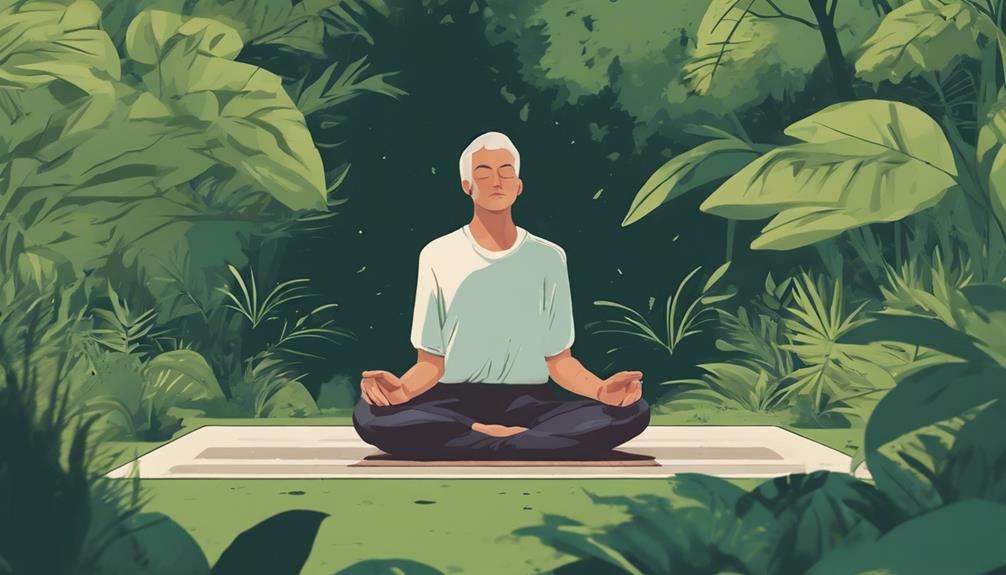
To alleviate anxiety and foster relaxation, incorporating breathwork practices into your daily routine can be a transformative tool.
Breathwork involves intentional control and regulation of your breathing patterns, allowing you to calm your nervous system, reduce stress hormones, and promote a sense of calm and relaxation.
Deep breathing techniques not only improve oxygen flow in your body but also enhance mental clarity and emotional well-being.
Mindfulness Meditation for Anxiety
When it comes to managing your anxiety, mindfulness meditation offers a powerful tool for finding calm amid the storm.
By focusing on your breath and staying rooted in the present moment, you can cultivate a sense of peace and clarity.
Engaging in mindfulness meditation practices regularly can help you better understand your emotions and reduce the grip anxiety has on your life.
Calming Breath Awareness
In the practice of mindfulness meditation for anxiety, honing in on the sensation of breathing serves as a powerful tool to foster awareness and presence. By focusing on your breath, you can tap into a range of benefits that aid in managing anxiety:
- Promotes Relaxation: Calming breath awareness helps reduce anxiety by inducing a state of relaxation.
- Reduces Racing Thoughts: By concentrating on your breath, you can quiet the mind and reduce racing thoughts that intensify anxiety.
- Calms the Nervous System: Mindfulness meditation for anxiety through breath awareness can help soothe the nervous system, lowering stress levels.
- Enhances Self-Awareness: This practice boosts emotional regulation and increases self-awareness, aiding in understanding and managing anxiety triggers.
- Fosters Inner Peace: Through breath awareness, you can cultivate a sense of calm and stability in the present moment, fostering inner peace amidst anxiety.
Present Moment Focus
Engage in mindful observation of the present moment to cultivate a sense of calm and reduce anxiety levels effectively. Mindfulness meditation, with its focus on the present moment, allows you to let go of worries about the past or future.
By paying attention to sensations like your breath or body movements, you can cultivate awareness and decrease stress. Studies have shown that this practice can reduce symptoms of anxiety disorders and improve overall well-being.
When you practice present moment focus, you learn to respond to anxiety triggers with clarity and calmness. This approach promotes a non-judgmental attitude towards your thoughts and feelings, fostering emotional resilience and peace within yourself.
Incorporating mindfulness meditation into your routine can have a significant positive impact on managing anxiety.
Creating a Personalized Practice

To personalize your meditation practice effectively, consider tailoring it to your unique preferences and needs. Here are some tips to help you optimize the benefits of your personalized practice:
- Choose the Right Time and Place: Select a time and location that align with your schedule and where you feel most comfortable and at ease.
- Experiment with Different Styles: Try various meditation techniques like guided meditation, mindfulness, or mantra meditation to discover what suits you best.
- Adjust Session Duration: Adapt the length of your meditation sessions to fit your daily routine, making it easier to incorporate this practice into your life.
- Enhance Your Environment: Consider adding calming music or incorporating aromatherapy into your meditation space to create a more soothing and relaxing atmosphere.
- Personalize Your Practice: Tailoring your meditation practice to your needs can help reduce anxiety, enhance overall well-being, and make your mindfulness journey more fulfilling.
Frequently Asked Questions
How Does Mindfulness and Meditation Help Anxiety?
Mindfulness and meditation help anxiety by reducing stress, enhancing self-awareness, and promoting emotional regulation. These practices connect mind and body, offering relaxation techniques, cognitive awareness, and coping mechanisms. They improve mental clarity, inner peace, and overall well-being.
What Are the Benefits of Meditation and Mindfulness?
Meditation and mindfulness offer a multitude of benefits. They can help you reduce stress, improve focus, find emotional balance, increase self-awareness, make better decisions, boost creativity, reduce inflammation, strengthen immunity, enhance sleep, and improve relationships.
Does Meditation Help With Health Anxiety?
Meditation helps with health anxiety by calming your mind, reducing stress, and promoting mental well-being. It enhances coping strategies, promotes relaxation through breathing exercises, and fosters a strong mind-body connection. It aids in stress management, emotional regulation, and self-care.
How Meditation Cured My Anxiety?
In your journey, meditation transformed your anxiety. Through personal experience, you found inner peace, mental clarity, and emotional balance. It offered stress relief, coping strategies, and a healing path, connecting mind and body while enhancing self-awareness with relaxation techniques.
Conclusion
You've now unlocked the ultimate secret to banishing anxiety forever!
With the power of meditation and mindfulness, you can conquer stress, find inner peace, and live your best life.
By incorporating these practices into your daily routine, you'll become an anxiety-fighting superhero, ready to take on any challenge with calm and clarity.
Say goodbye to worry and hello to a brighter, more peaceful future.
You've got this!

